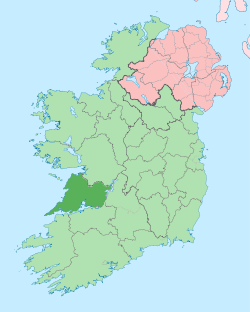Feakle
| Feakle An Fhiacail | |
|---|---|
|
Feakle - An Fhiacail - geograph.org.uk | |
 Location in Ireland | |
| Coordinates: 52°55′33″N 8°38′59″W / 52.92589°N 8.649763°WCoordinates: 52°55′33″N 8°38′59″W / 52.92589°N 8.649763°W | |
| Country | Ireland |
| Province | Munster |
| County | County Clare |
Feakle (historically Feakell and Fiakil, from Irish: an Fhiacail, meaning "the tooth")[1] is a village in County Clare, Ireland, in a civil parish and Roman Catholic parish of the same name.
Location
"Paroiste na fiacaile" means parish of the tooth. A legend says that the tooth of Mochonna, the patron saint, fell out in this place, where he built his church. Other theories are that the place is named after a church that was roofed with "fiathgail", a rough local grass, or that the name comes from "Fia-Choill", the wood of the deer.[2]
The civil parish is in the Tulla Upper barony, 4.5 miles (7.2 km) northwest of Scariff on the road to Gort. In 1837 it contained 8,844 inhabitants and covered about 30,000 acres (12,000 ha).[3] An 1845 description said "the surface consists of the loftiest, wildest, and most northerly of the western uplands of the county; and includes the southern declivities of the Slieve-Baghta mountains, and those offshoot ranges and masses which embosom Lough Graney, and stretch toward Lough O’Grady. The highest ground is on the west, and has an altitude of 1,312 feet."[4]
The parish of Feakle is in the Roman Catholic Diocese of Killaloe. Parish churches are St Joseph's in Kilclaren and St Mary's in Feakle.[5] The village population in 2006 was 122.[6] It neighbours Lough Derg and the towns of Tulla and Scarriff. Feakle is famous for its traditional music festival.
History
St. Mochonna is venerated as the patron saint of Feakle. The ancient ruins of his church were destroyed in the early 19th century.
On December 12, 1974, Irish Republican Army and Sinn Féin leaders met at Smith's Hotel, Feakle, with the leaders of the main Irish Protestant Christian denominations (Church of Ireland, Methodist, and Presbyterian) to discuss ways of resolving the Northern Ireland crisis. The Gardaí (Irish police) broke up the meeting. Although any wanted IRA men had already departed, the churchmen did pass on the list of Republican demands to the British government. Methodist leader Eric Gallagher was in attendance and later became the subject of the book Peacemaker by author Dennis Cooke.
People
- Herbalist Biddy Early (1798 - 1874). Famous as a healer and accused, under an antiquated law, in 1865 of witchcraft, Biddy was well known in the area. Local folklore says that if you leave a coin at her house you will have good health, but take a coin and you will have bad luck.
- Brian Merriman is associated with the area. Although neither born, nor did he die, in Feakle, he chose to be buried here where he had spent many years of his life. Feakle was the location and background of his only major work, a long poem in Irish, entitled Cúirt an Mheán Oíche (The Midnight Court). A monument to his memory has been erected by An Cumman Merriman (the Merriman Society) and may be seen in the local graveyard.
- Johnny Patterson (1840-1889) singer and composer was born in Kilbarron near Feakle
- Ger Loughnane, former Clare hurler and manager of Galway hurling team (b.1953).
- Martin Hayes, b. 1962, world-famous fiddler, was born in Feakle.
References
- ↑ Placenames Database of Ireland (see archival records)
- ↑ "Feakle Historical Background". Clare County Library. Retrieved 2014-03-31.
- ↑ Samuel Lewis (1837). "Feacle". County Clare: A History and Topography. Retrieved 2014-03-31.
- ↑ "Feakle". Parliamentary Gazeteer of Ireland. 1845. Retrieved 2014-03-31.
- ↑ "Feakle". Diocese of Killaloe. Retrieved 2014-03-31.
- ↑ Census 2006 for Feakle, p. 140
See also
External links
| ||||||||||||||||||||||||||||||
| ||||||||||||||||||
| ||||||||||||||||||||||||||||||||||||||||||||||||||||||

